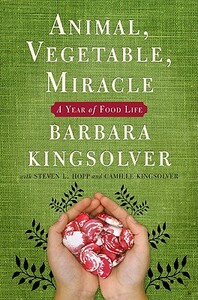You need to sign in or sign up before continuing.
Take a photo of a barcode or cover
So far a very interesting read. Really inspired Tim and I to be more conscious about how/what we eat. Making me crave asparagus
An enlightening and inspiring story of a family and their year of eating local and growing most of their food by a much loved author.
Lots of good information but the author is a bit full of herself and it made reading this a little difficult at times.
emotional
funny
hopeful
informative
lighthearted
reflective
slow-paced
I WANT to rate this higher, because I generally agree with and appreciate the message, but *oh my god* what a slog this was to read. Kingsolver is a pretty writer but not an entertaining one.
If I were twenty years older and ten years less woke I might have actually enjoyed it.
If I were twenty years older and ten years less woke I might have actually enjoyed it.
Barbara Kingsolver ventures into non-fiction as she recounts a year on her family farm in Appalacia. During this year, the family followed the 100-mile rule, whereby all--or at least most--of their food came from within 100 miles of their home. She talks about various fruits and vegetables and how they are grown, as well as the experience of raising their own poultry and daughter Lily's successful egg business. The book also features shorter essays by Kingsolver's husband, a professor, and her daughter Camille, a college student.
I have always loved Kingsolver's books. I thought The Poisonwood Bible was one of the most amazing books I've ever read and I thoroughly enjoyed The Bean Trees and Pigs in Heaven, so I desperately wanted to love this book, too. But after the first 50-100 times I felt shamed by her tone, I just lost interest. I appreciate what she's doing and I respect her point of view (maybe not so much on eating animals), but there are numerous instances where she puts herself above the rest of us and she failed to connect with the reality for most Americans who don't have thousands of acres to farm and lucrative book deals to pay for it. Having said all of that, however, this is a fantastic book club book! It raises profound questions and is bound to get everyone thinking, which ultimately makes it a book I would recommend to others.
I have always loved Kingsolver's books. I thought The Poisonwood Bible was one of the most amazing books I've ever read and I thoroughly enjoyed The Bean Trees and Pigs in Heaven, so I desperately wanted to love this book, too. But after the first 50-100 times I felt shamed by her tone, I just lost interest. I appreciate what she's doing and I respect her point of view (maybe not so much on eating animals), but there are numerous instances where she puts herself above the rest of us and she failed to connect with the reality for most Americans who don't have thousands of acres to farm and lucrative book deals to pay for it. Having said all of that, however, this is a fantastic book club book! It raises profound questions and is bound to get everyone thinking, which ultimately makes it a book I would recommend to others.
I absolutely loved this book. It was exactly what I was looking for to read about moving to a farm and living the locavore life. I love Kingsolver's writing as she documents her year of farming and healthy eating. There are snippets of political information that while informative, was not overwhelming. Her daughter even gives a new perspective and recipes with their harvest. This book is now a reference for how I will live my future life on our farm.
Animal, Vegetable, Miracle is now ten years old and still as relevant as ever. Kingsolver's account of her family's year of eating locally brings up some extremely important points about the environmental costs of industrial food industry, the oil involved in shipping foods from all over the world and about the benefits of the local food movement. I do think that there is increased awareness of these issues since the time of AVM's publication but there is still a long way to go. The book certainly made me more attune to my choices and how they might impact the environment. I found myself rolling my eyes, however, at the author's idealization of farm life and holier-than-thou tone. Generally I like my nonfiction to be presented in a way that is generally non-condescending to the reader. I think it is important to get past those hurdles and read the book anyway.
Great book. Informative and easy to read. I liked the tone the author took to explain her family's "locavore" adventures. She wasn't preachy, but you couldn't help but want to make at least a few changes in your own food habits to try and help the planet.
I agree with Valerie's review--the only downside to this excellent book is Kingsolver's occasional lapse into beating the reader with a local carrot. Despite that, this may be the most thought-provoking book I've read all year. I am more aware of the mileage that some of my favorite foods must travel to reach me. She and her family set out on an experiment that was worthwhile for them and inspirational for me.


